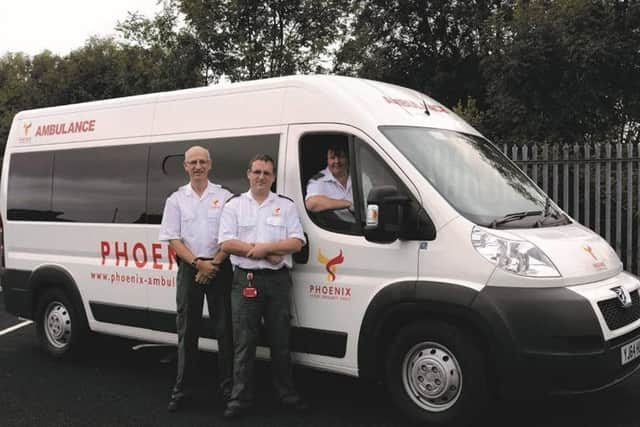Warwick-based private ambulance service calls for 'fair treatment' from HMRC
and live on Freeview channel 276
The owner of a Warwick-based private ambulance service is calling for 'fair treatment' from HMRC.
Guy Barnard, owner of Phoenix Private Ambulance Service is calling for 'fair treatment from HMRC because services are being threatened by a shortfall of £75,000 which is owed from VAT recovery'.
Advertisement
Hide AdAdvertisement
Hide AdFirst established in 1983, Phoenix Ambulance provides essential non-emergency patient transport services to people in Warwickshire and the surrounding counties.


Duties involve providing timely and safe transport for patients, including those in wheelchairs and stretchers, undergoing hospital appointments and discharges, and to and from care homes.
Speaking from the operations hub near Warwick Hospital in Millers Road, Guy Barnard said: “As you would expect, our business runs on tight margins.
"Our clients include NHS hospitals, private hospitals, social services departments, our local Clinical Commissioning Group plus private individuals and their families.
Advertisement
Hide AdAdvertisement
Hide Ad“We have received unfair and inconsistent treatment from HMRC as there are other companies in our sector offering identical services who are able to reclaim VAT because they are ‘zero rated’ yet we cannot because HMRC applies a ‘VAT exempt rate’ to our business.
"The people who are set to potentially lose out are those in Warwickshire and neighbouring counties who depend on our crucial service.
"We know that it costs about £950 a day to keep someone in hospital and we allow for quick patient discharges, avoiding ‘bed blocking’.
" A missed hospital appointment costs the NHS about £250 every time this occurs, so our service helps keep the NHS running smoothly.
Advertisement
Hide AdAdvertisement
Hide Ad“We need to recover VAT from vehicle and equipment purchases, fuel, training and maintenance costs which can then be spent on providing a better service in these extreme circumstances when we are dealing with the additional complication of COVID-19.”
Phoenix Private Ambulance Service is a founder member of a new organisation set up by the Midlands-based accountancy firm, Dains LLP. Phil Luty, an Indirect Tax Partner, established the Patient Transport Action Group (PTAG) to support firms concerned about the unfair treatment by HMRC.
Phil Luty said: “Guy Barnard heads up a vital service where patient care and compassion is at the very centre of everything they do.
“It is completely unfair that HMRC has created a distorted and uneven marketplace for providers of non-emergency patient transport services (NEPTS), to the detriment of firms such as Phoenix Ambulance who are doing remarkable work to support the NHS and patients.
Advertisement
Hide AdAdvertisement
Hide Ad“Unfortunately, when it comes to VAT, this sector is not a level playing field.
"This is because HMRC has deemed some companies to be ‘zero rated for VAT’ whilst others are ‘VAT exempt’.
"This distinction is significant because, although all ambulance companies do not charge VAT on the sale of their services, zero rated companies are able to reclaim input VAT whilst exempt companies are not.
"Consequently, the cost of procuring, re-designing, and then operating ambulances is 20 per cent higher for those companies that have been deemed VAT exempt.
Advertisement
Hide AdAdvertisement
Hide Ad"This makes it extremely difficult for them to remain competitive and continue to provide this essential service to their community.
“Also, HMRC’s own Brief (03/19) on the matter indicates that such non-emergency patient transport services qualify for zero-rating because of a test for ‘notional’ vehicle seating capacity.
"The vehicles used by Phoenix Private Ambulance Service can all be converted to seat 10 people or more, which is the VAT Act 1994’s definition of what qualifies for zero-rating, if they are, like Phoenix’s vehicles, instead simply fitted out differently to accommodate wheelchairs and stretchers.
"Zero-rating of the service would allow for the £75,000 VAT recovery on associated costs, which is currently blocked. Essentially, HMRC has a two-tier approach for the sector which is unjust and needs urgent attention.
"We’ve had a very helpful conversation with the MP for Warwick and Leamington, Matt Western, who will be assisting us in communicating this important message.”